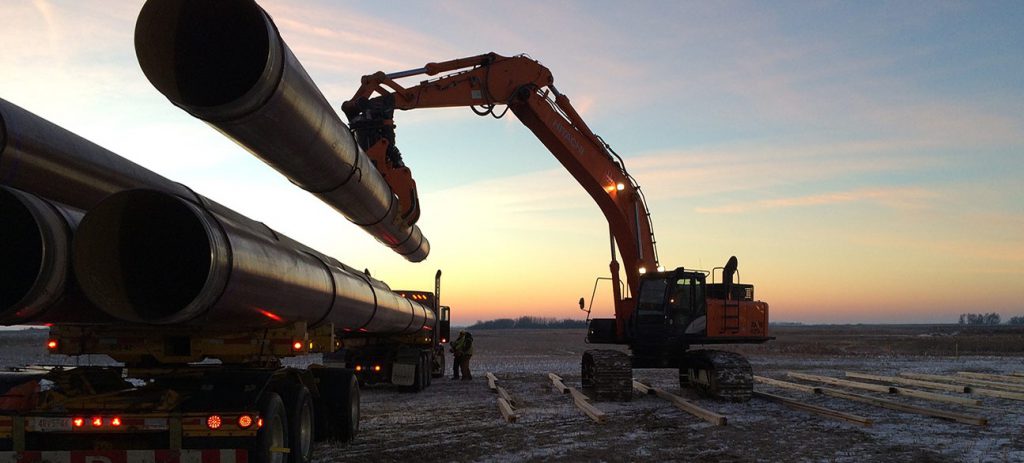The folly of cancelling pipelines vital for energy supply

By Bruce Lantz
The oil and gas industry is facing more pressure as anti-pipeline opponents, perhaps buoyed by U.S. President Joe Biden’s revoking of the permit for Keystone XL and TC Energy Corp.‘s [TRP-TSX] subsequent termination of the project, gear up for a summer of protest.
Recently more than 1,000 tribal and environmentalist protestors failed in their attempt to pressure the Minnesota Court of Appeals to reject approval for the Calgary, Alberta-based Enbridge Energy [ENB-NYSE] Line 3 pipeline replacement project, which would carry Canadian oilsands oil and regular crude from Alberta to Enbridge’s terminal in Superior, Wisconsin and opponents are equally determine to quash the company’s Line 5 pipeline work in Michigan.
But protestors quick to oppose the pipelines should be careful what they ask for – in case they get it – says an official of the company under attack for building them.
Enbridge Corporation spokesperson Michael Barnes said protestors who rallied recently to oppose the firm’s Line 3 pipeline extension through Minnesota and those, including Gov. Gretchen Whitmer, who oppose Line 5 through Michigan are ignoring the benefits those pipelines will bring to the American people.
“Both Line 3 and Line 5 are vital to the energy supply and to the economies of both the U.S. and Canada, and have operated safely and reliably for decades,” he told Resource World Magazine.
The Line 3 court ruling allows Enbridge to proceed with its $2.9-billion construction of a 542-kilometre Minnesota segment of a larger $7-billion project to replace a 50-year-old crude oil pipeline that has been deteriorating and runs only at half capacity. The project is nearly done except for the Minnesota section, which is about 60% complete. The $500-million Line 5 Great Lakes Tunnel Project will replace only the pipeline section running through the Straits of Mackinac and put it inside a tunnel well below the lakebed.
“The project is an investment in Minnesota’s energy infrastructure supporting 8,000 jobs during construction . . . and an additional $30 million in annual property taxes to Minnesota after its first year in service,” said Barnes, noting that Minnesotans consume more than 12.8 million gallons of petroleum products daily and must rely on imports to meet their energy needs. The state’s two refineries produce more than two-thirds of Minnesota’s petroleum products and 80% of these products are refined from Canadian crude oil, with 100% of the pipeline-delivered crude coming from Enbridge’s system.
“Replacing the existing Line 3 with the newest and most advanced pipeline technology will help protect our environment for generations to come,” said Barnes. “The replacement project will provide much-needed incremental capacity to support Canadian crude oil production growth, and U.S. and Canadian refinery demand.”
The Line 3 benefits are obvious: a $334-million payroll for 8,600 jobs, at least half to be filled locally; a $2-billion boost to the Minnesota economy; boosting Enbridge property taxes in Minnesota to nearly $50 million; and, more than $4 million in community investment.
Line 5 is a “critical source” of 540,000 barrels per day of natural gas liquids and crude oil supply for Ontario, Quebec, Michigan, Wisconsin, Indiana, Ohio and Pennsylvania. Its shutdown would put Ohio refineries at risk and generate a daily shortage of 14 million gallons of gasoline, diesel and jet fuel. The closure of just one could result in the loss of $5.4 billion in annual output to Ohio and southeast Michigan, and the loss of thousands of jobs, Barnes explained.
A multi-party Canadian House of Commons Special Committee report in April affirmed the importance of Line 5 to both Canada and the U.S. and recommended urgent, bi-national executive action to resolve the dispute.
“Line 5 is a significant aspect of Canada’s economic relationship with the United States and contributes to secure energy supplies in both countries,” the report states. “Its shutdown could have many implications, including reduced safety, shortages of various energy products on both sides of the Canada-U.S. border, transportation bottlenecks for Alberta’s crude oil, and job losses for Canadian and American workers.
Despite all that, pipeline opponents could appeal the Line 3 decision to the Minnesota Supreme Court and are calling on President Biden to cancel the project as he did with Keystone XL. They say the heavy oil would accelerate climate change and risk spills in sensitive areas where indigenous Americans harvest wild rice, hunt, fish, gather medicinal plants and claim treaty rights, according to an Associated Press (AP) story.
The activists say they will engage in a summer of resistance against the pipeline. “Minnesota does not need this conflict,” said Winona LaDuke, executive director of the indigenous-based Honor the Earth environmental group, according to the AP. “Minnesota has already had enough police problems, and we are very upset at the level of private security and police forces that are all over the north right now . . . So we’ll stand our ground . . . and more will be coming.”
